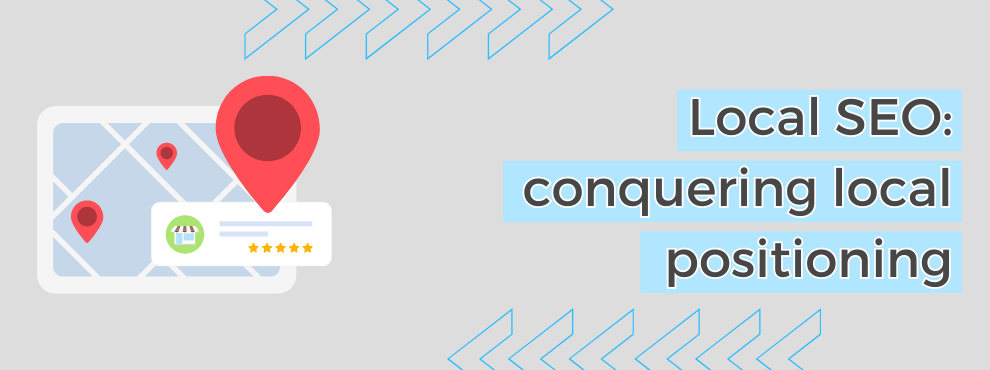In an increasingly digitized world, achieving a prominent position in search engines is essential for any business aspiring to success. But when it comes to ecommerce and brick-and-mortar stores, it’s not just about competing globally, but also about standing out in the local community. This is where local SEO comes into play, providing a significant competitive advantage.
Local SEO focuses on optimizing your online presence to attract more business from searches made by potential customers in your immediate geographic area. This type of SEO is crucial not only for businesses with physical locations but also for ecommerce businesses that, while operating predominantly online, aim to attract customers from specific areas. This may include promoting products that are particularly popular in certain regions or running campaigns targeted at local festivities.
Implementing an effective local SEO strategy can be particularly transformative for platforms like PrestaShop, which allow merchants to optimize and customize their stores for specific audiences. Throughout this post, we will explore the keys to conquering local SEO and how these strategies can be specifically integrated into your PrestaShop store to maximize your reach and sales in the local market.
Table of contents
Understanding Local SEO
Local SEO differs from traditional SEO because it focuses on optimizing online presence to attract traffic and customers from specific geographic areas. This geographic specificity is crucial for both businesses with physical presence and online stores looking to attract local clientele. In the mobile era, where searches for “near me” and “in [city name]” are increasingly common, mastering local SEO can mean the difference between being visible to your target market or remaining hidden among the crowd.
Why is local SEO important?
- Enhanced visibility in local searches: Google and other search engines prioritize local results for certain searches, especially those made from mobile devices. By optimizing your site and content for local SEO, you increase the chances of appearing in these critical searches, just when users are most inclined to make purchasing decisions.
- Higher conversion rates: Local searches tend to have a stronger purchase intent behind them. A user searching for a product or service “near me” is more likely to make a purchase shortly. Optimizing for these searches can, therefore, lead to significantly higher conversion rates.
- Local competition: In local SEO, you are competing with other businesses in your area, not with the entire world on the Internet. This reduces the field of competition and gives you a better chance to stand out.
Impact of local SEO on ecommerce
For ecommerce businesses, local SEO goes beyond simply attracting customers who can visit a physical store. It is also an opportunity to segment the market according to specific regions, tailor offers and promotions to local buying trends, and increase relevance in local communities through personalized content and special offers.
By understanding these fundamentals, businesses can begin implementing specific tactics that we will discuss in the following sections to improve their visibility and relevance in local searches.
Key Elements of Local SEO
Mastering local SEO requires an understanding and effective application of several key elements. These components are essential to ensure that your business is not only visible but also relevant and appealing to the local audience. Here we will detail the most important ones.
Google My Business (GMB)
The starting point for any effective local SEO strategy is Google My Business. This free tool allows you to manage how your business appears in Google Search and Google Maps, including adding your business to the map, updating information such as opening hours and contacts, and collecting customer reviews.
- GMB Optimization: Make sure your GMB profile is fully filled out with accurate and up-to-date information. This includes everything from the physical address and phone number to high-quality photos of your business or products.
- Customer Reviews: Encourage your customers to leave reviews on your GMB profile. Positive reviews not only improve your credibility but can also influence your ranking in local search results.
Local Citations
Citations are mentions of your business on other websites, especially local and niche directories. Citations help build authority and trust in your business and are a relevant factor for local search algorithms.
- Consistency in NAP: Ensure that your Name, Address, and Phone (NAP) are consistent across all platforms. Consistency in this data is crucial for search engines to trust the validity of your business.
Reviews and Ratings
Along with Google My Business, reviews on other websites such as Yelp, Tripadvisor, or even on your own Facebook page, play a crucial role. Reviews are indicative of your business’s reputation and are considered by search engines when determining your position in local results.
- Review Management: Actively respond to all reviews, whether positive or negative. Good review management shows that you value your customers and their opinions, which can improve the public perception of your brand.
By implementing these elements effectively, your business will not only improve its visibility in local searches but also strengthen its online reputation. These are fundamental aspects that can make a big difference in how local customers find and perceive your business online.
Local SEO Strategies for Ecommerce
Ecommerce has particularities that can be exploited to improve local SEO. Below, we will discuss some effective strategies that can help you stand out in your local area and attract more customers.
Product Page Optimization
Customizing product pages to include local information can have a significant impact on your local SEO. This includes:
- Mentions of Geographic Areas: Incorporate city or regional names in your product descriptions when relevant. This can help capture the attention of local buyers looking for specific products in their area.
- Localized Meta Tags: Ensure that the meta tags of your product pages include relevant local terms. This can help improve ranking in specific local searches.
Localized Content
Creating content that resonates with the local audience not only improves your local SEO but also strengthens the connection with your community. Consider the following ideas:
- Blogs and Articles: Write about local events, festivities, or market trends specific to your area.
- Local Shopping Guides: Publish guides that mention how your products can be used in local events or specific seasons.
Local Link Building Strategies
Building links with other local businesses or participating in community events can significantly increase your visibility and local relevance.
- Collaborations and Sponsorships: Participate in local events or collaborate with other local businesses to get links to your site.
- Local Directories: Ensure that your business is listed in all relevant local directories, which can help improve your visibility in searches related to your area.
Use of Social Media
Social media platforms can be a powerful tool to promote your local presence. Use these platforms to:
- Promote Local Offers: Advertise special offers or events on your social networks that are relevant to your local audience.
- Interaction with the Local Community: Engage with the local community on social networks to increase visibility and improve brand perception.
Implementing these strategies will not only help improve your positioning in local searches but can also increase customer loyalty and brand awareness in the local community.
Integration of Local SEO into PrestaShop
PrestaShop is a popular ecommerce platform that offers various tools that can be used to optimize local SEO. Here we explain how you can make the most of these features to improve your visibility and performance in local searches.
Use of PrestaShop Modules for Local SEO
PrestaShop has a wide range of modules that can help improve your local SEO. Some of the most effective ones include:
- Google Maps Module: Integrate Google Maps into your site to display your physical location. This is not only useful for site visitors but also helps reinforce local relevance to search engines.
- SEO Module: There are several modules designed to improve different aspects of SEO, including meta tag and URL optimization, which you can customize to include specific local terms.
Localized Content Optimization
Content creation is crucial for local SEO, and PrestaShop allows you to easily manage this content.
- Localized Landing Pages: Create specific landing pages for different locations or markets. This may include customized content that speaks directly to the audience of a particular region.
- Integrated Blog: Use PrestaShop’s blog functionality to publish articles that focus on local topics, which can improve your relevance for local searches and attract relevant traffic.
Personalization and Automated Responses
Automated Responses for Comments and Questions: Set up personalized automated responses for frequently asked questions that may include local references, helping to improve interaction and customer satisfaction.
Analysis and Results Tracking
Don’t forget the importance of measuring and analyzing your website’s performance. PrestaShop offers analytics tools that allow you to see how local optimizations are affecting your traffic and sales.
- Google Analytics: Integrate Google Analytics to track user behavior and local traffic performance. This will help you identify which local SEO strategies are working best and adjust your tactics accordingly.
Implementing these features within PrestaShop will not only help optimize your store for local searches but will also improve the overall user experience by providing localized and relevant information.
Measuring Success in Local SEO
To ensure that your local SEO strategies are working as expected, it is essential to continuously measure their performance. This not only allows you to see what is working and what needs adjustments but also helps demonstrate the ROI of your local SEO efforts. Below, we detail the key tools and metrics you should consider.
Analysis Tools
- Google Analytics: This tool is indispensable for any SEO campaign, including local SEO. You can use Google Analytics to track page visits, user behavior, and conversions by geographic location. Make sure to properly set up goals and segments for accurate data on local traffic.
- Google My Business Insights: Google provides statistics within Google My Business that provide valuable insights into how customers search for your business and from where, what actions they take on your listing, and how they engage with your content.
Key Metrics
- Visibility in Local Searches: Measure how your pages appear in local searches, and how much organic traffic they are generating specifically from these searches.
- Local Conversion Rate: Track how many of the local visits are converting into sales or desired actions, such as filling out a form or registering for an event. This is a crucial metric for evaluating the effectiveness of your local SEO.
- Reviews and Responses: Monitor the quantity and quality of reviews you receive, as well as how frequently you respond to them. Positive reviews and active interaction can improve your local SEO.
By using these tools and metrics, you will be able to have a clear understanding of the impact of your local SEO strategies and adjust your tactics as needed to improve your results.
Conclusion
Local SEO is more than just a facet of digital marketing; it is an essential strategy that can determine the success of your business in the local market. By implementing the practices we have explored in this post, you will not only improve your online visibility but also establish a stronger connection with your local community. This is especially relevant for ecommerce platforms like PrestaShop, where customization and local optimization can lead to significant improvements in traffic and conversions.
We encourage you to review each of the elements and strategies discussed: from optimizing your Google My Business and ensuring consistency in local citations, to adopting advanced tactics of localized content and community collaborations. Additionally, remember the importance of measuring the impact of your efforts through analytical tools to continue improving and adapting your strategies to the needs of your local audience.
Local SEO not only helps you compete; it positions you as a preferred and relevant option in your community. Start optimizing your local presence today and watch your business grow in relevance and profitability.
Related Posts










Deja un comentario